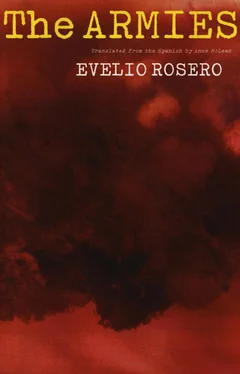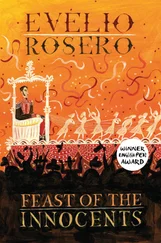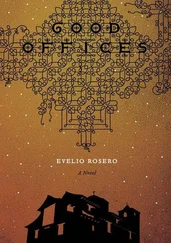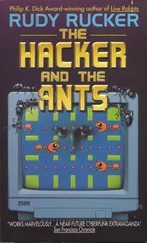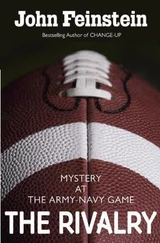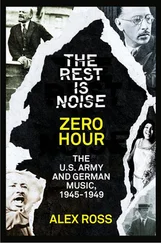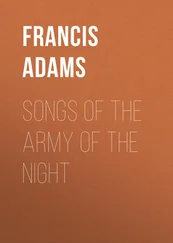Yes, they repeat: “They killed a newborn baby girl,” and cross themselves. “Chopped into pieces. God help us.”
Geraldina bites her lips.
“They could have left her at the church door, alive,” she moans — what a beautifully candid voice — and asks of the heavens: “Why kill her?”
That is how they are talking, and, suddenly one of my pupils — Rosita Viterbo? — who I never noticed watching me watch Geraldina (surely because my wife is right and I no longer manage the discretion of years gone by: am I drooling? God, I shout wordlessly at myself: Rosita Viterbo, saw me suffering at the vision of the two open thighs showing infinity inside), Rosita stroking her cheek with one finger and addressing me with mild sarcasm, says:
“And what do you think, profesor? ”
“It’s not the first time,” I manage to say. “Not in this town, nor in the country.”
“I’m sure it’s not,” says Rosita. “Nor in the world. That we already know.”
“Many children, as I recall, have been killed by their mothers after birth; and they always alleged the same thing: it was to save them from the world’s misery.”
“That’s horrible what you say, profesor ,” Ana Cuenco rebels. “How despicable, and I beg your pardon, but that does not explain, much less justify, the death of any newborn baby.”
“I never claimed it justified it,” I defend myself and I see that Geraldina has closed her knees again; she stubs the cigarette out on the dirt floor, ignoring the ashtray, runs her two long hands over her hair, which she wears up today, and exhales listlessly, surely appalled by the conversation, or weary?
“What a world,” she says.
The children, her children, come back to her, one on each side, as if protecting her, without knowing exactly what from. Geraldina pays Chepe and stands up stricken, as if under an enormous weight — the inexplicable conscience of an inexplicable country, I say to myself a burden of a little less than two hundred years which nonetheless does not keep her from stretching her whole body, lifting her breasts beneath her dress, sketching an uncertain smile, as if licking her lips.
“But let’s go to Hortensia’s,” she pleads with a wail. “It’s dark already.”
And Rosita Viterbo, my one-time pupil, watches me in a distracted way.
“Aren’t you coming, profesor? ”
“I’ll come later,” I say.
In short, I did not go to call on Hortensia Galindo this year.
I said goodbye to Chepe and turned at the next corner, on the way to Mauricio Rey’s house. I have confused the streets and come out at the edge of town, darker and darker, strewn with filth and rubbish — some old, some new a sort of cliff which I peer over: it must be thirty years since I’ve been out here. What is it, what sparkles down there like a silver ribbon? The river. It used to rage all through the hellish summer, and it was a torrent. In this mountain town there is no sea, but there was a river. Today, desiccated by a pallid heat, it is a little meandering thread. That was another time when we used to go to the most abundant bends in its waters, in the middle of summer, not only to fish: naked and immersed up to their necks the girls smiled, whispered, floated, blurred, in the clear water. But later they sprang out more real and furtive, on tiptoes, looking from one side to the other, taking big steep jumps while they dried off and dressed, quickly, looking carefully every once in a while through the trees. Soon they relaxed, believing the world around them slept: only the song of a small owl, the song of my chest high up in an orange tree, the heart of every adolescent boy in town watching them. Because there were trees for all.
There is no sign of a moon, occasionally a street light, there is no living shadow in the streets, the gathering at Hortensia Galindo’s house is quite an event, as if the war had arrived in the plaza, in the school, at your door, when the whole town hides.
To get to Rey’s house I have to return to Chepe’s and from there restart the route as if the past could be restarted. I have to remember: the house was the last one along a dirt road, near an abandoned guitar workshop: then came the cliff. The sleepy-looking girl who opens the door tells me that Mauricio is sick in bed, that he cannot see anyone.
“Who is it?” Mauricio Rey’s voice comes from inside.
“It’s me.”
“ Profesor , what an unexpected pleasure! Will miracles never cease? You know the way here.”
Whose is this girl? I seem to see her and not see her.
“Whose daughter are you?”
“Sultana’s.”
“I know Sultana. She was rather naughty, but she studied. Do you know me?”
“You’re the schoolteacher.”
“ Profesor Pasos, we used to say ,” Rey shouts from his room, “ why does he always fail us? ”
He is the oldest of my pupils, and one of my few friends now. There, in his bed, a bearded sixty-year old, under the yellow light from the bare bulb, he laughs, more toothless than me: he doesn’t have his bridge in, is he not embarrassed with this girl? For the last four years, he told me once, when the commemoration takes place and his wife — his second wife, because he is a widower — goes to offer her condolences for the disappearance of Saldarriaga, he has pretended to be ill and stayed at home and done with the girl who happened to be there what he could not do the whole year long.
“So, what news?” he asks. “I was thinking about the party, profesor. ”
“What party, if you please?”
“The celebration, for Saldarriaga.”
“Celebration?”
“Celebration, profesor , and forgive me, but that Saldarriaga was, or is, if he’s alive, a triple son of a bitch.”
“I haven’t come to talk about that.”
“What then, profesor , don’t you see I’m pressed for time?”
The truth is that I do not myself know why I have come: what am I going to invent? Is it this girl? Have I come here to meet this girl with her hair so recently messed?
“My knee hurts,” it occurs to me to tell Rey.
“It’s old age, profesor, ” he roars. “What do you think you are, immortal?”
He is drunk, I realize. At his side, scattered on the floor, are two or three aguardiente bottles.
“I thought you just pretended to be ill,” I say, pointing to the bottles.
He laughs and offers me a glass, which I refuse.
“Go, profesor. ”
“You’re throwing me out?”
“Go to Maestro Claudino’s place, and tell me about it later. He’ll fix your knee.”
“Is he still alive?”
“Say hello to him from me, profesor. ”
The girl accompanies me to the door: sumptuous in her innocence, unbuttoning her blouse to save time.
I was still a boy when I met Claudino Alfaro. He is alive, then. If I am seventy, he must be a hundred, or close to it. why did I forget about him? Why did he forget about me? Instead of entrusting myself to Ordúz, the doctor, Mauricio Rey reminded me of Maestro Claudino, who I had long given up for more than dead, since I didn’t even remember him. Where have I existed these years? I answer myself: up on the wall, peering over.
And I leave the town, unwary beneath the night, walking to the cabin of Maestro Claudino, folk healer. The pain in my knee, again, urges me on.
He is alive, so, he is alive, like me, I say to myself as I walk down the road. The last lights of the town disappear with the first bend, the night grows larger, with no stars. He will go on living while he heals: he makes his patients urinate into a bottle, then he shakes the bottle, and reads, against the light, the sicknesses; he straightens out muscles, sticks bones back together. “He is as alive as I believe I am,” I say to myself, and climb Chuzo’s mountain, following the bridle path. I must have stopped several times to rest. The last time I admit defeat and decide to go back; I suddenly discover that I have to drag my leg to make any progress at all. This outing was a mistake, I say to myself but I walk uphill, from stone to stone. At a bend in the path, already in the invisible jungle of the mountain, I give up and look for a place to rest. There is no moon, the night is still pitch black; I cannot see a pace in front of me, although I know I am halfway there: the Maestro’s cabin is at the back of the mountain, not at its summit, which today I would never reach, but rather skirting around halfway up. I find a mound finally, and sit down there. Above my knee the swelling has grown to the size of an orange. I am drenched in sweat, as if caught in the rain; there is no wind, and, nevertheless, I hear that something or someone is walking on and snapping the leaves and underbrush. I freeze. I try to distinguish between the shapes of the bushes. The noise approaches; what if it is an attack? It could be that the guerrillas, or the paramilitaries, have decided to take the town tonight, why not? Captain Berrío must be at Hortensia’s house, the guest of honor. The noises stop for an instant. Expectation makes me forget the pain in my knee. I am far from town, no one can hear me. They will probably shoot first and, then, when I am already dying, come and see me and ask who I am — if I am still alive. But they could also be soldiers, training at night, I tell myself, to calm down. “All the same,” I shout at myself, “they’ll shoot me just the same.” And, at that, with an explosion of leaves and stalks parting, I perceive something, or someone, leaping upon me. I scream. I reach out my arms, hands open, to repel the attack, the blow, the ghost, whatever it is. I know that this gesture is of no use, and I think of Otilia: Tonight you will not find me in bed. I do not know how long I have my eyes closed. Something touches my shoes, sniffs me. An enormous dog puts his paws on my lap, stretches, and now licks my face in greeting. “It’s a dog,” I say aloud. “It’s just a dog, thank God,” and I do not know if I am going to laugh or cry: as if I still love life.
Читать дальше
